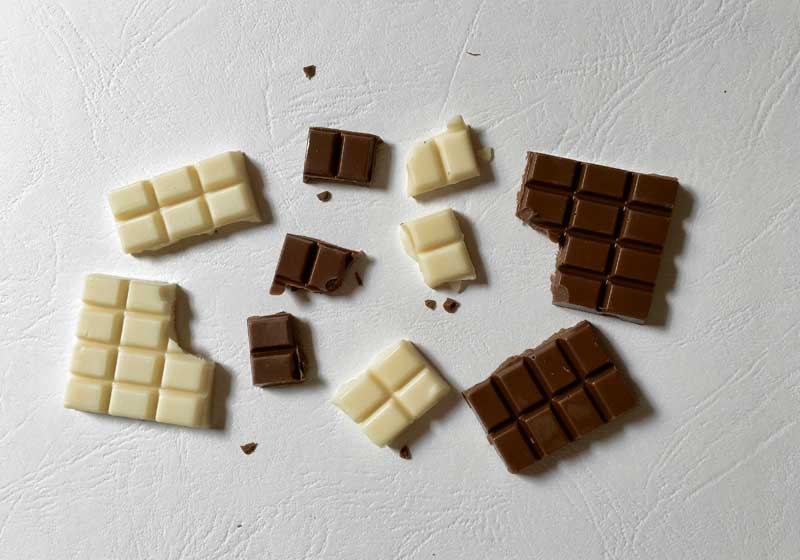By Marie-Antoinette Issa.
Chocolate has traditionally been celebrated as a decadent treat - the perfect addition to birthday cakes, brownies or simply enjoyed by the block!
Beyond its indulgent taste, there's been a growing buzz among wellness warriors who hail chocolate as a superfood, packed with nutritional clout. With so much information circulating, Clinical Nutritionist Michaela Sparrow is here to help separate fact from fiction when it comes to the purported health benefits of chocolate.

Fiction: All chocolate is created equal
Let’s start with the bad news. While it's true that chocolate can deliver some outstanding health benefits, not all chocolate is created equal. The nourishing qualities of chocolate are primarily associated with dark varieties, which have a higher cocoa content and fewer added sugars compared to milk or white chocolate.
"When indulging in chocolate for its health benefits, opt for varieties with at least 70% cocoa content to reap the maximum benefits,” says Michaela.
So, sorry - in this instance, while a scoop of Gelato Messina will taste amazing, it is not going to be your ticket to a rock-hard rig!
Fact: Antioxidants abound
One of the most touted health benefits of chocolate is its high antioxidant content.

"Cocoa beans, the main ingredient in chocolate, are rich in flavonoids, a type of antioxidant that can help protect the body from damage caused by free radicals” explains Michaela. "Dark chocolate, in particular, contains higher levels of flavonoids compared to milk or white chocolate. These antioxidants have been linked to improved overall health.”
Starting with your skin! For example, some studies suggest chocolate can protect against sun damage, improve blood flow and even increase skin density and hydration. While that doesn’t mean swapping your night cream for a chocolate chip cookie, there’s certainly no harm in including a square of Lindt alongside your bedtime serum.
Fact: Let’s hear it for heart health
Several studies have also specifically suggested that consuming moderate amounts of dark chocolate may have a positive effect on heart health.
"This is because the flavonoids found in dark chocolate have also been shown to improve blood flow, lower blood pressure and reduce the risk of blood clots, all of which can contribute to a healthier heart,” says Michaela.
"However, it's essential to consume chocolate in moderation, as excessive intake can lead to weight gain and other health issues as a consequence.”
Fiction: Chocolate calories don’t count
Unfortunately, while chocolate may offer some health benefits, it's not a miracle weight loss aid.

"Despite claims that certain compounds in chocolate can boost metabolism and promote weight loss, the evidence is limited and inconclusive. In reality, chocolate is calorie-dense and can contribute to weight gain if consumed in excess,” says Michaela.
There’s certainly no harm in treating yourself to a drizzle of melted chocolate over your waffles, but you may want to keep your quantities in mind!
Fact: Brain-boosting properties
Many people turn to chocolate for its brain-boosting properties and there's some science to back up this claim. Alongside studies that support the claim that the stimulant substances (such as theobromine and caffeine) in cacao can improve short-term brain function, the benefits of chocolate may also be long-term.
"The flavonoids, in particular epicatechins, may stimulate the formation of neurons in the brain - supporting healthy neurogenesis throughout adulthood which may help reduce the risk of age-related cognitive decline and Alzheimer's risk,” says Michaela.
Furthermore, chocolate contains compounds like phenylethylamine and serotonin, which can promote feelings of happiness and well-being.
Additionally, the act of indulging in chocolate can trigger the release of endorphins, also known as the ‘feel-good’ hormones, further enhancing its mood-enhancing effects.
Fiction: Chocolate cures all
While chocolate may provide a temporary mood boost, it's not a cure-all for mental health issues. While indulging in a piece of chocolate can offer a momentary reprieve from stress or sadness, it's essential to address underlying issues and seek professional help if needed.
Relying on chocolate as a coping mechanism for emotional distress can lead to unhealthy eating habits and may exacerbate existing mental health concerns.
Fact: Make moderation your mantra
Finally, while chocolate does offer some health benefits, it's essential to consume it in moderation as part of a balanced diet. While some varieties (dark chocolate, in particular) may be rich in antioxidants and may promote a range of health benefits, it’s certainly not a miracle cure for serious health issues.
"As with any food, it's best to enjoy chocolate in moderation and focus on maintaining a healthy lifestyle overall,” says Michaela.
By separating fact from fiction, chocoholics can indulge in their favourite treats, while reaping the delicious and potential health benefits.
Michaela Sparrow is a Naturopath, Clinical Nutritionist, certified anti-aging practitioner, BHSc, ACAAM, mANTA.





